“Far across the blue waters . . .”
If you are of a certain age and grew up in a household where the radio was tuned to certain stations, you know the rest of that lyric:
“lives an old German’s daughter.”
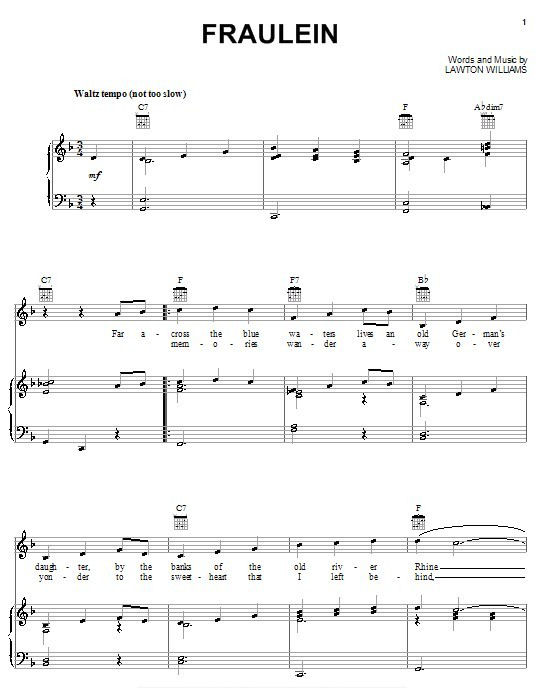 The year was 1957. The song was “Fraulein,” and it brought country music immortality to its writer.
The year was 1957. The song was “Fraulein,” and it brought country music immortality to its writer.
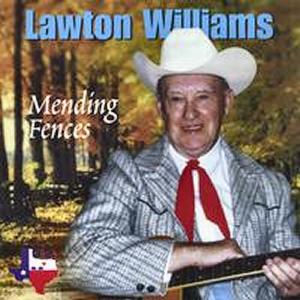 That writer was Fort Worth’s Lawton Williams.
That writer was Fort Worth’s Lawton Williams.
 Lawton Edgar Williams was born in Tennessee in 1922, son of a fiddle-playing sharecropper. Music-making appealed to Lawton more than sharecropping did, so he traded his hoe for a hoedown and began to perform locally. Then, while he was in the Army during World War II, he met singer-songwriter Floyd Tillman, who encouraged him to write songs. Williams performed, recorded, and wrote in the late 1940s but without much success. Then he wrote a song inspired by his broken romance with “a little blonde-headed German girl” he had met during World War II. In the song the fraulein is in Germany, but during the war Williams had actually been stationed in Houston.
Lawton Edgar Williams was born in Tennessee in 1922, son of a fiddle-playing sharecropper. Music-making appealed to Lawton more than sharecropping did, so he traded his hoe for a hoedown and began to perform locally. Then, while he was in the Army during World War II, he met singer-songwriter Floyd Tillman, who encouraged him to write songs. Williams performed, recorded, and wrote in the late 1940s but without much success. Then he wrote a song inspired by his broken romance with “a little blonde-headed German girl” he had met during World War II. In the song the fraulein is in Germany, but during the war Williams had actually been stationed in Houston.
 By 1948 Lawton Williams had rebounded from that broken romance and married Jeanette Crews in Detroit, Michigan. By 1952 he and Jeanette were in Fort Worth, living in a small wood-frame house at 312 West Hammond Street on the South Side, two houses from the Katy railroad track. The house has since been demolished.
By 1948 Lawton Williams had rebounded from that broken romance and married Jeanette Crews in Detroit, Michigan. By 1952 he and Jeanette were in Fort Worth, living in a small wood-frame house at 312 West Hammond Street on the South Side, two houses from the Katy railroad track. The house has since been demolished.
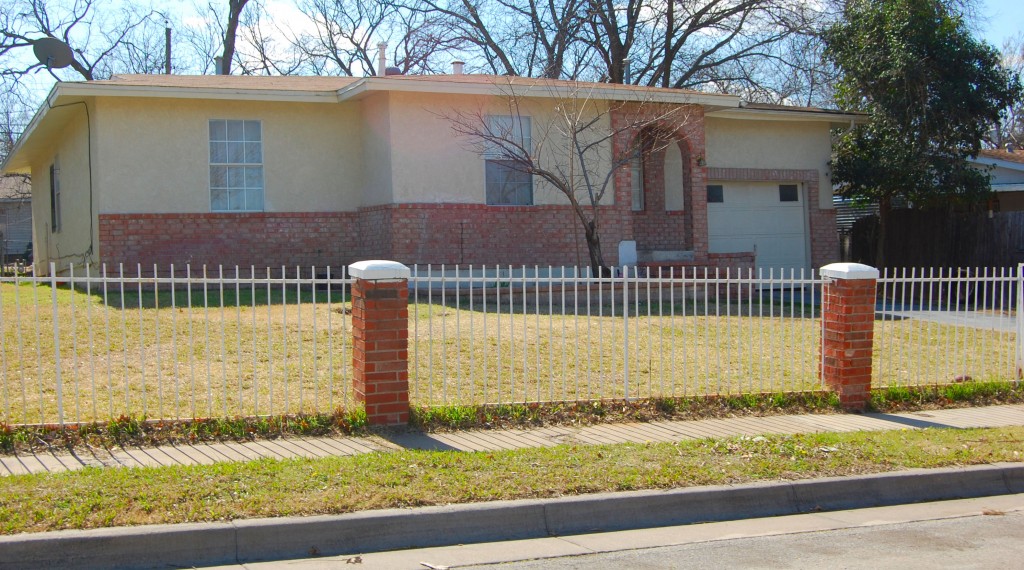 When Lawton Williams wrote “Fraulein” he was living in Poly at 3432 Avenue D, just east of Texas Wesleyan University. The house of “Fraulein” still stands. (Before Williams moved from that address, just one block east at 3512 Avenue D lived teenager Chet Helms, who in the 1960s would become associated with a different kind of music.)
When Lawton Williams wrote “Fraulein” he was living in Poly at 3432 Avenue D, just east of Texas Wesleyan University. The house of “Fraulein” still stands. (Before Williams moved from that address, just one block east at 3512 Avenue D lived teenager Chet Helms, who in the 1960s would become associated with a different kind of music.)
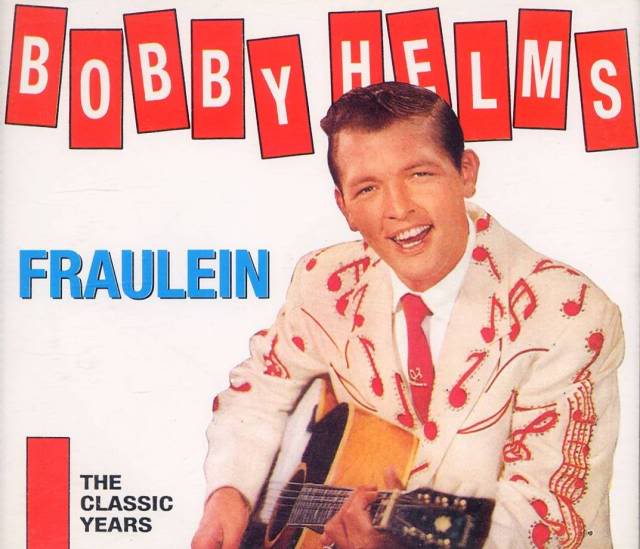
Then came 1957. Singer Bobby Helms (no relation to Chet), freshly signed to the Decca record label, recorded and released “Fraulein” on a single in January. The song resonated with ex-GIs who had been in Europe during the war. “Fraulein” hit the country chart in February. And it stayed there a full year, four of those fifty-two weeks at no. 1. And you didn’t have to be “country” to know of the old German’s daughter. “Fraulein” crossed over to the pop chart and rose to no. 16. “Fraulein” was named Country Song of the Year at the Billboard and Cashbox awards in 1957.
The song came to be known as the “Texas national anthem” because of its two-stepability and was credited by some with reviving national interest in country music. Deejay Bill Mack later said: “One thing about ‘Fraulein,’ many people say that was the song that turned country music around in 1957. When Hank Williams died [in 1953] the bottom dropped out. ‘Fraulein’ got us going again.”
All this for a song that was the B side of Helms’s fourth single. The year 1957 was a ten-gallon hat-trick year for Helms. He had three hits: “Fraulein” (no. 1), “My Special Angel” (no. 1), and “Jingle Bell Rock” (no. 7).
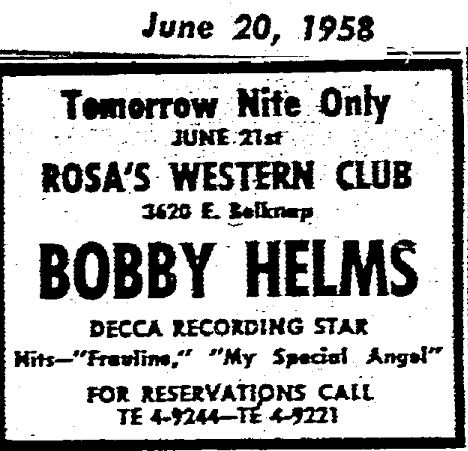 As did so many country stars, Bobby Helms appeared at Rosa’s Western Club on East Belknap Street and no doubt sang the hit song of the hometown boy.
As did so many country stars, Bobby Helms appeared at Rosa’s Western Club on East Belknap Street and no doubt sang the hit song of the hometown boy.
After the Helms hit, “Fraulein” would be recorded by many artists, including Ernest Tubb, Hank Locklin, Jerry Lee Lewis, Mickey Gilley, Willie Nelson, Boxcar Willie, Steve Lawrence, Roger Miller, Conway Twitty, Chuck Berry, Bill Monroe, and David Allan Coe. Townes Van Zandt also recorded “Fraulein” (when Van Zandt was young, his father had agreed to buy Townes his first guitar only after Townes promised to learn to play “Fraulein”). And Kitty Wells recorded an “answer song”: “I’ll Always Be Your Fraulein.” And, yes, if you are wondering if “Fraulein” was ever recorded in Mandarin Chinese, Singapore singer/songwriter Fu Suyin did just that in 1967.
“Fraulein” made Lawton Williams a ten-year overnight success in 1957.
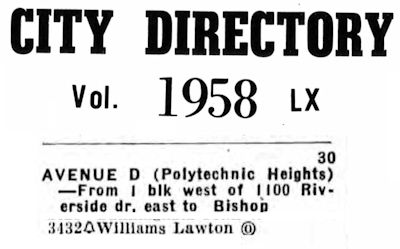 But in 1958 he was still living in his modest house on Avenue D.
But in 1958 he was still living in his modest house on Avenue D.
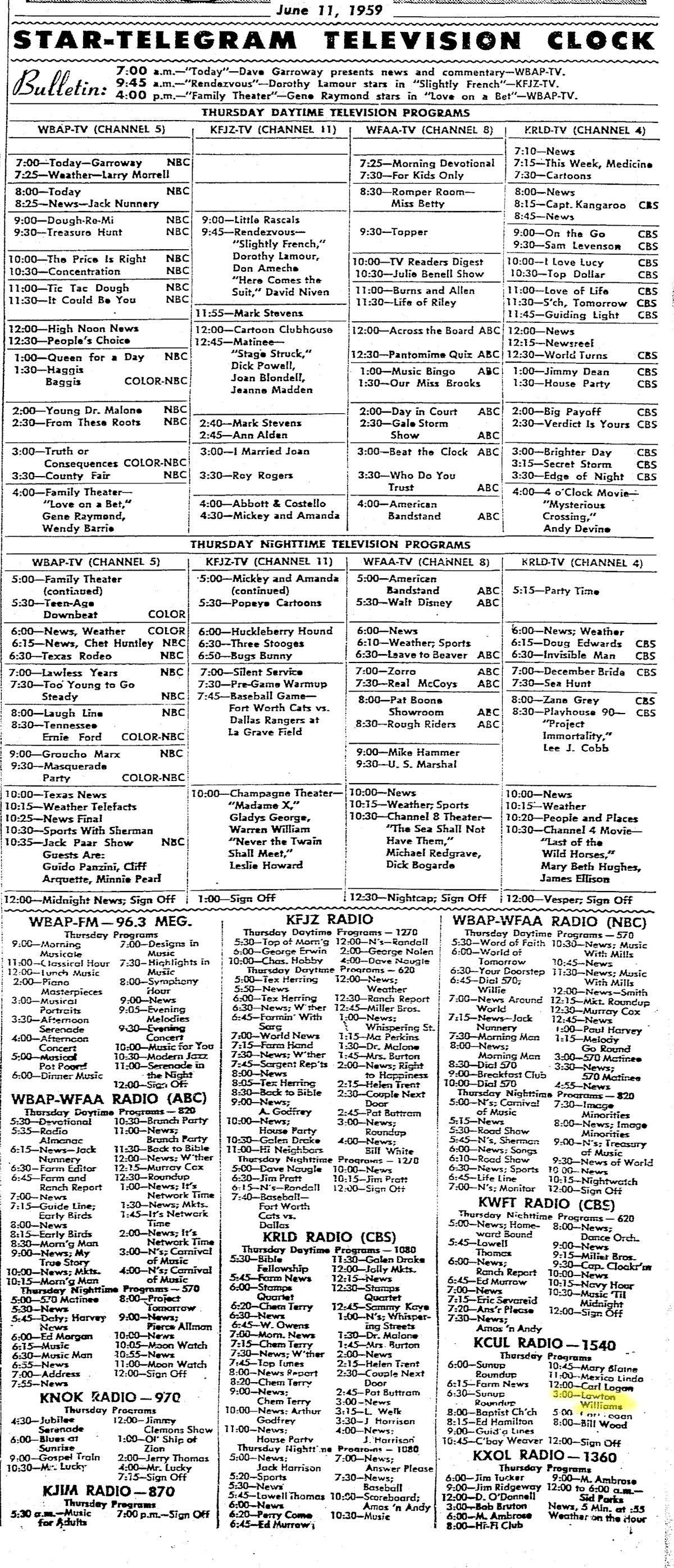 Williams continued to work as a deejay at KCUL. (I have kept Williams’s listing in the context of the TV and radio schedules because such relics are great snapshots of our past.)
Williams continued to work as a deejay at KCUL. (I have kept Williams’s listing in the context of the TV and radio schedules because such relics are great snapshots of our past.)
 With the success of “Fraulein,” Williams was a busy man, appearing locally at venues big and small, such as a show at the “Rec” in Sycamore Park sponsored by Charlie Hillard.
With the success of “Fraulein,” Williams was a busy man, appearing locally at venues big and small, such as a show at the “Rec” in Sycamore Park sponsored by Charlie Hillard.
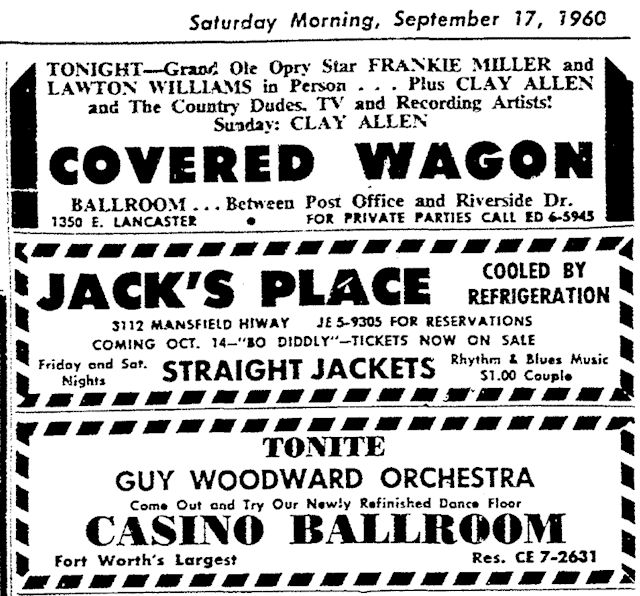
The Covered Wagon was located opposite today’s Union Gospel Mission. In the ad for Jack’s Place, note the appearance by Bo Diddley.
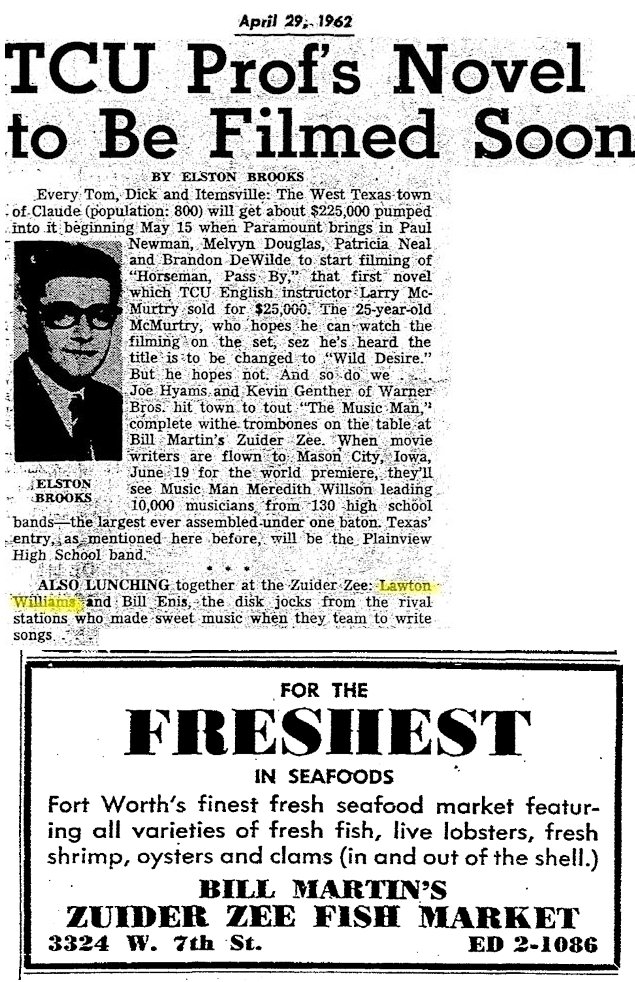 In 1962 Williams and Bill Enis co-wrote “Shame on Me,” which was a hit for Bobby Bare in that year. Bill was the brother of football star Hunter Enis. In the Elston Brooks column note that Larry McMurtry was an English instructor at TCU. The movie of his novel Horseman, Pass By would be released as Hud.
In 1962 Williams and Bill Enis co-wrote “Shame on Me,” which was a hit for Bobby Bare in that year. Bill was the brother of football star Hunter Enis. In the Elston Brooks column note that Larry McMurtry was an English instructor at TCU. The movie of his novel Horseman, Pass By would be released as Hud.
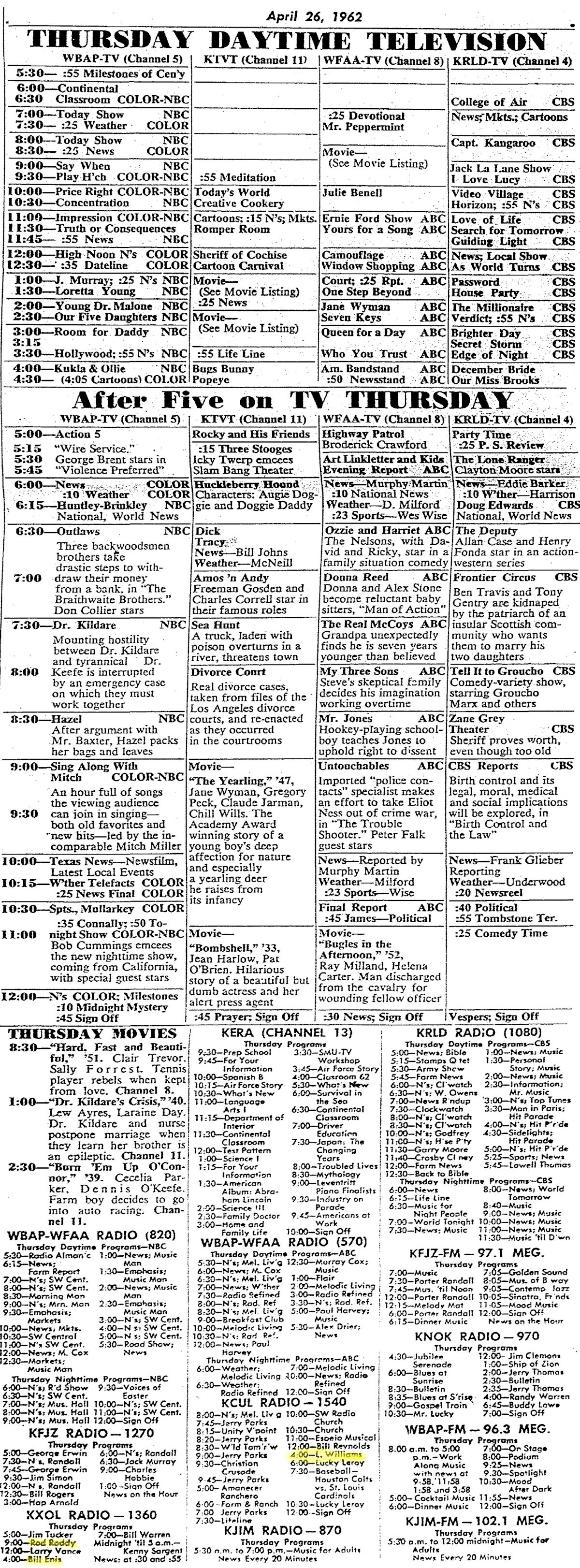
Lawton Williams was a deejay at KCUL, Bill Enis at KXOL. Note another deejay at KXOL in 1962: Rod Roddy would join The Price Is Right in 1986.
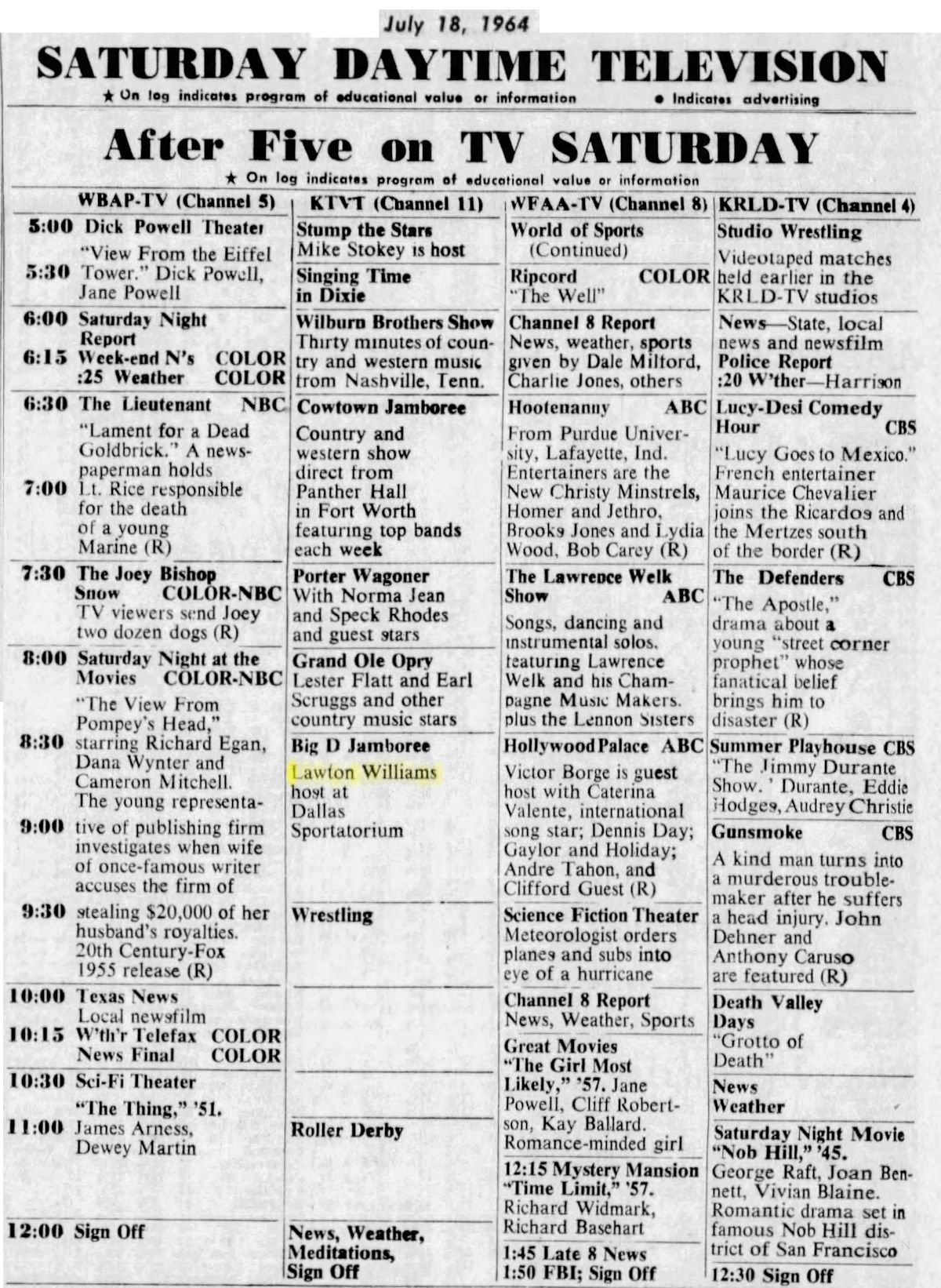 Lawton Williams continued to write songs, but by the 1960s he also was a performer and emcee on KTVT‘s Big D Jamboree program broadcast Saturday nights from the Sportatorium in Dallas. He also hosted a country music program on radio station KPCN in Fort Worth and was program director and a deejay at KCUL.
Lawton Williams continued to write songs, but by the 1960s he also was a performer and emcee on KTVT‘s Big D Jamboree program broadcast Saturday nights from the Sportatorium in Dallas. He also hosted a country music program on radio station KPCN in Fort Worth and was program director and a deejay at KCUL.
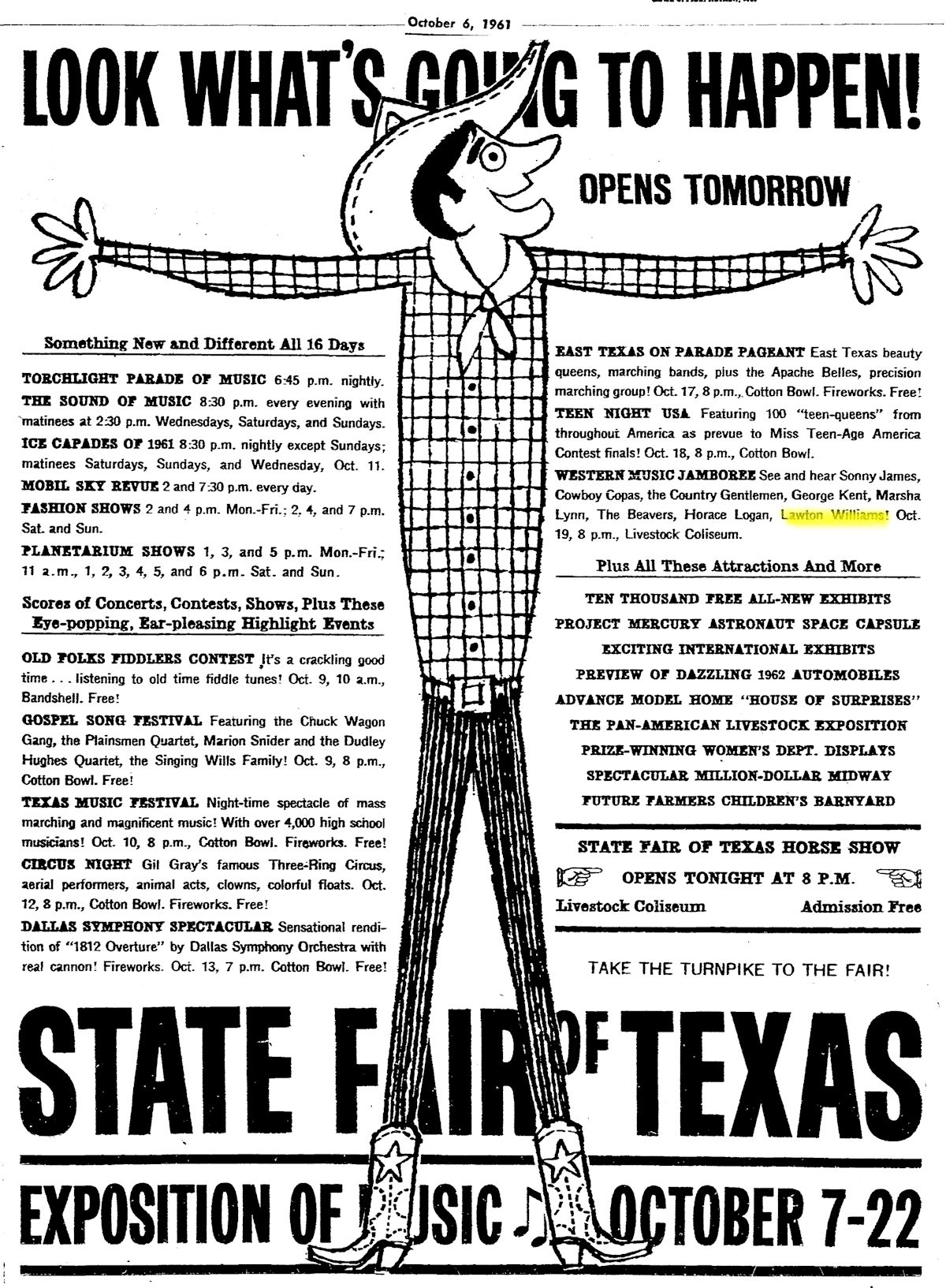
Williams appeared at the state fair in 1961.
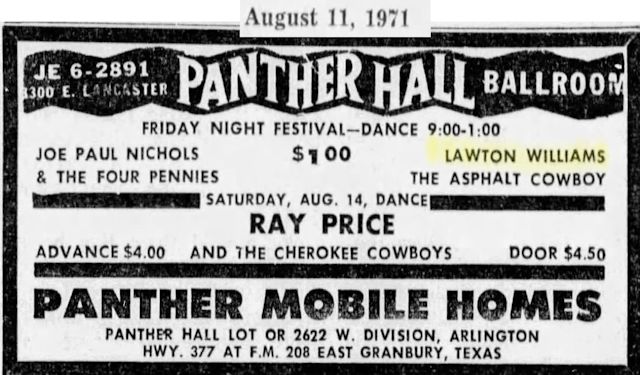
And at Panther Hall in 1971.
Along with the personal appearances, Williams continued to record, including on the Le Bill label of Fort Worth’s Major Bill Smith (producer for Paul and Paula, Bruce Channel). But Lawton Williams is remembered as a songwriter, for the songs he wrote that were recorded by others. Many other artists had hit records with Lawton Williams songs, including Hank Locklin (“Paper Face” and “Geisha Girl,” an Asian equivalent of the Teutonic “Fraulein”), Jim Reeves (“Señor Santa Claus”), Gene Watson and Little Jimmy Dickens (“Farewell Party”), and George Jones and Elvis Costello (“Color of the Blues,” co-written with Jones).
Songwriting success would move Lawton and Jeanette Williams to a substantial home in the hills of Woodhaven Country Club Estates.
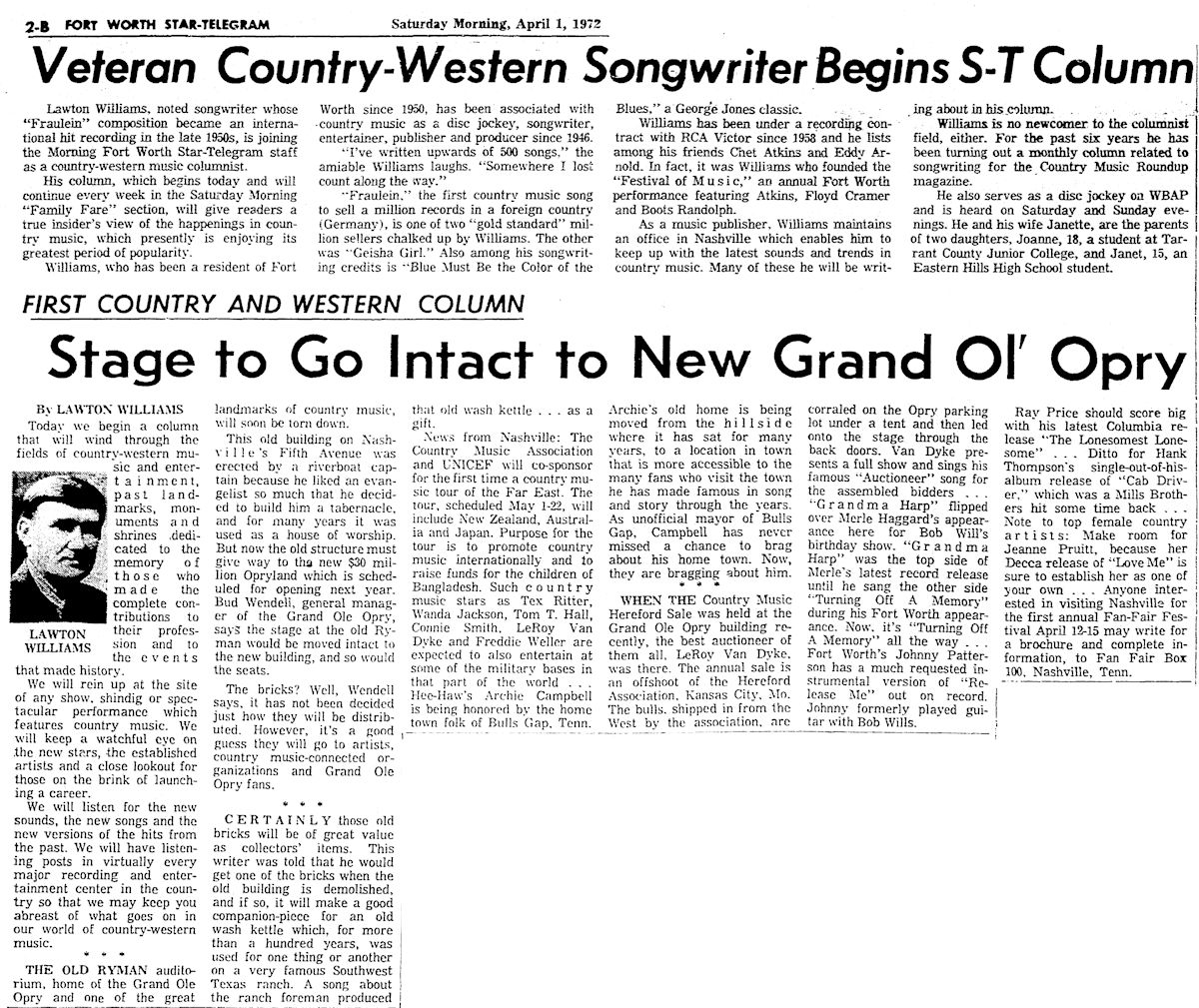 In the early 1970s Williams wrote a weekly column in the Star-Telegram.
In the early 1970s Williams wrote a weekly column in the Star-Telegram.
In 1991 Williams was honored with a star on the Walk of Fame at the Country Music Hall of Fame and Museum in Nashville.
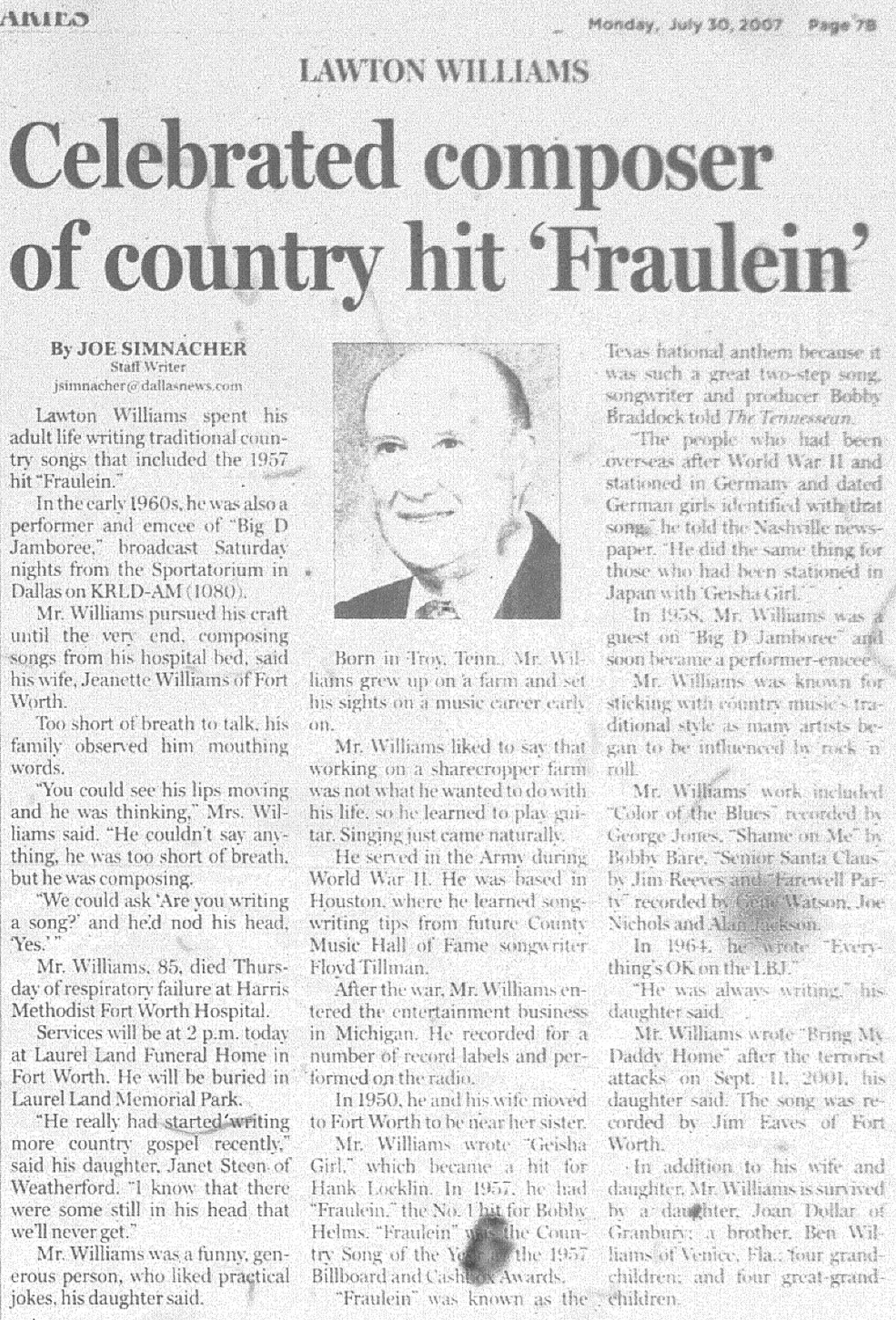
Lawton Williams died on July 26, 2007. Suffering from a respiratory illness, at the end he did not have enough breath to talk, but he continued to write songs, mouthing the words silently as he wrote.
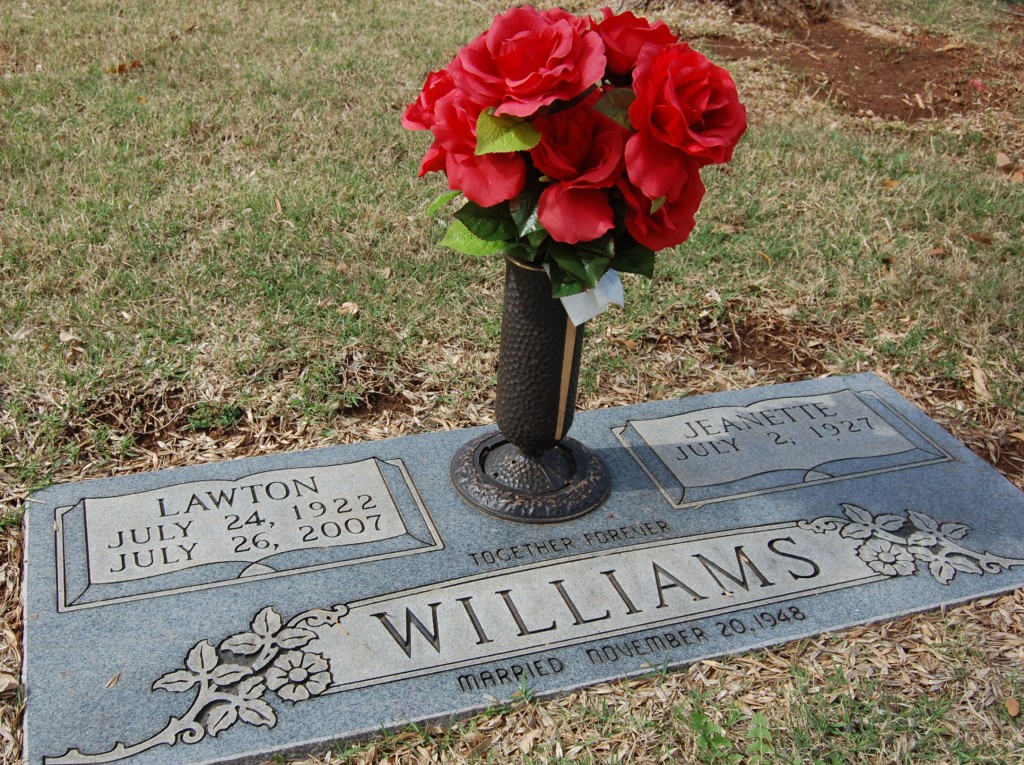 Lawton Edgar Williams is buried in Laurel Land Cemetery, not far from another music-maker, Smith Ballew.
Lawton Edgar Williams is buried in Laurel Land Cemetery, not far from another music-maker, Smith Ballew.
Bobby Helms sings “Fraulein”: https://www.youtube.com/watch?v=VjEtkAwG3yM. (And if that fiddle accompaniment puts goosebumps on your arms and a quiver on your lip, you can thank Tommy Jackson, who was the busiest bow in Nashville.)
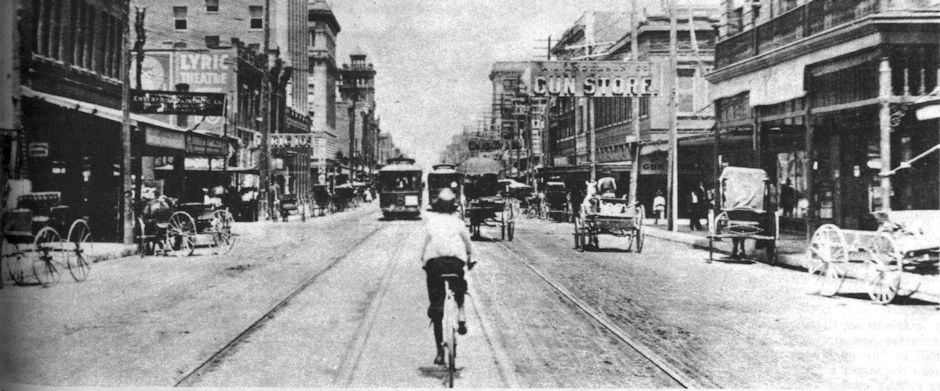





I just played Fraulein on a weekly radio show I do that’s targeted for blind listeners in Houston. I did a some web search for Lawton and found this. Fort Worth is my home town and when I rejoined KFJZ as a DJ in January, 1964 after two years in the army, Bill Enis was the program director and Lawton was in sales. I didn’t know much about him as a songwriter and performer at that time. Lawton wrote the words and music to Shame On me, Bobby Bare’s first hit, Bill wrote the spoken narration in the middle of the record.
Mr. Marshall, I remember you from Fort Worth radio in the 1960s! Good to hear from you in the new century.
Another insightful and entertaining blog post!
Thanks, Howard. That is still one of my favorite country songs.